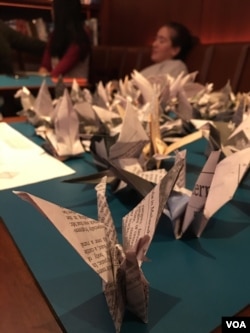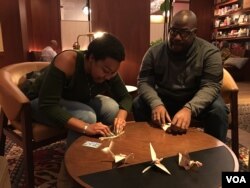Seda Nak left her restaurant here one recent morning to join fellow immigration campaigners to hand-make 2,300 paper cranes, which she says represents the 23 million immigrants in the United States.
Nak and her friends are leading a community effort as part of a national campaign that opposes a new “public charge” rule proposal from the Department of Homeland Security (DHS). They see the proposal as discriminatory against the country’s immigrant population.
“We're actually doing it to show that we are all affected by this concept and the negative connotation of what an immigrant is,” Nak told VOA Khmer at the Sunday morning gathering at the Eaton DC Hotel’s library.
“I thought it's a great way to engage the community ... by showing that we do support our own as well as our neighbors who are affected by this,” said Nak, a businesswoman and activist whose Cambodian grandmother came to the United States as a refugee in the 1980s.
The paper bird cranes will be distributed to the Department of Homeland Security or the White House, Nak said.
Under the proposal, the DHS will determine whether immigrants constitute a “public charge,” meaning they are defined as “likely to become primarily dependent on the government for subsistence” and require “long-term care at government expense.”
Under U.S. immigration law, defining someone as a “public charge” means they are unlikely to be admitted to the United States and can be denied a green card.
Advocates say the proposal will negatively affect millions of immigrants and potential immigrants who need government assistance, such as food stamps, housing and health care benefits.
“Unfortunately, the more of these public assistance [programs] that you do use, [the more they] can actually be used against you,” said Nak. “So in a sense it's a little bit of an elitist discriminatory practice that the DHS is actually putting in place.”
Thu Nguyen, senior communications associate at OCA-Asian Pacific American Advocates, one of about a dozen of non-profit organizations participating in the campaign, named OneNation, said: “This is an issue because a lot of the immigrants when they first come here, they need a little bit of federal assistance in order to get their foot in America and build themselves up and so this policy proposal, if it passes, will affect 23 million immigrants who are looking to get a green card.”
The advocacy groups have travelled and organized to increase public awareness in several states with large immigrant populations, including California, New York and some Midwestern states.
The campaigners say the proposed regulation was intended “to create a de facto legal wall to keep immigrants out” and “to rig the system against children, elders, people who are low income, limited English and those who have medical conditions or with disabilities.”
But Trump administration officials say the rule was aimed at promoting what they call “self-sufficiency” for those admitted into the U.S.
“Self-sufficiency has long been a basic principle of the United States immigration law,” the proposal says.
Kirstjen Nielsen, DHS secretary, told NBC News recently that the rule would “promote immigrant self-sufficiency and protect finite resources by ensuring that they are not likely to become burdens on American taxpayers.”
According to recent research by the Pew Research Center, the majority of Americans view immigrants as having a positive impact on the country due to the work ethic and talents they bring.
“Everyone deserves peace and happiness. If you can help someone with that, why not?” asks Mya Brown, a salon owner in Washington, DC, who joined Nak at the hotel’s library. “Just have a heart and help out and, you know, we're trying to spread love around the world, so do it.”
Campaigners and members of the public have until December 10 to submit comments on the proposal to the DHS.
“No one wants to be homeless,” said Dominic Green, Brown’s boyfriend and a freelance photographer and filmmaker. “No one wants to be deported to another place just because they try to live a life that is better than wherever they came from.”









